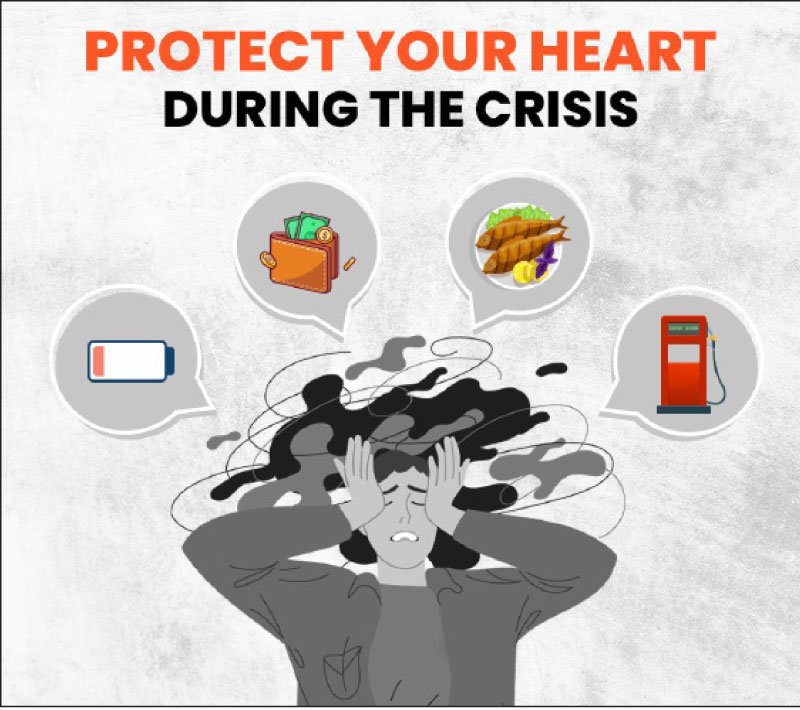Thursday Feb 19, 2026
Thursday Feb 19, 2026
Monday, 23 May 2022 02:10 - - {{hitsCtrl.values.hits}}

 When the country’s economy has ground to a halt, and day-to-day life becomes yet another challenge, with most of the essential items, food and medication getting scarce and prices escalating by the second, it is natural that it takes a toll on us both mentally and physically straining our health, happiness and our lives.
When the country’s economy has ground to a halt, and day-to-day life becomes yet another challenge, with most of the essential items, food and medication getting scarce and prices escalating by the second, it is natural that it takes a toll on us both mentally and physically straining our health, happiness and our lives.
While some of us are amazing responders, some, unfortunately, succumb in front of multiple challenges and crises such as the socio-economic crisis we as a nation face today.
As a practicing cardiologist, I observe a significant rise in heart attacks during the last few months in the country. The data we have analysed showed an approximate increase of 20% in the Western Province.
Further, I sadly witness the depth of the impact of the present social determinants on cardiovascular disease and the magnitude of increase of the risk factors and causes that imbalance one’s health.
Living through a crisis with many hardships and emotional turmoil exposes you to a whirlpool of stress that may contribute to cardiac risk. Stress plays a significant role and entangling between anger, anxiety, insecurity, and hostility affect your cardiovascular health, heightening the chances of developing heart attack and even sudden death as such that we witnessed among some of the people who were standing in long queues.
How can you protect your heart health amidst a crisis?
I know it is easier said than done, but here are a few stress-easing tips that you can adopt to keep yourself fit while you unwaveringly fight through the crisis and reach the sunnier days.
When the world around you changes, your lifestyle also needs to change and follow the course. Let us try to always see the silver lining.
1. Healthy meals – Remember, you are your first and foremost priority. Enjoy a healthy and balanced diet every day that includes vegetables, greens, and fruits and excludes additional oils, sugar and salt. Try as much as possible to avoid the consumption of rice during breakfast and dinner. Yes, while rice digests easily, it also leads to an instant spike in blood glucose levels and offers an instant boost of energy. Rice also contains more calories in the form of carbs that store fat in your body. Ignore the consumption of processed food that contains industrially-formulated ingredients. Processed food is also high in sugar, fat, and empty calories and may lead to obesity, high blood pressure, elevated cholesterol, stress and depression, and develop the risk of cardiovascular disease.
2. Engage in physical activities – Try to engage yourself in physical activities that will alter your mood and help reduce the risk of depression, stress, and anger you encountered during the crisis. In my opinion, I strongly believe that walking 40 minutes per day, 5 days a week, would be an easy and effective way of getting your fitness back on track and combating illness. After all, precaution is better than cure isn’t it?
3. Relaxation – Try to engage in activities that help to relax your mind, body, and soul. Listen to music, watch a movie, catch up with loved and dear ones or go out with your family.
4. Adequate sleep – Anxiety during the crisis may keep you wide awake but try to get ample sleep as it affects your energy levels, mental alertness, and physical health. Try to get at least 7 hours of sleep a day.
5. Limit the intake of alcohol, stop smoking and other substances – During a crisis, people tend to take more alcohol. Smoking and consuming alcohol will only worsen your health. As you are aware, it can persuade individuals to be impulsive and lead to poor decision-making, which may create unnecessary setbacks. The harmful chemicals can also increase the chance of cardiovascular diseases.
6. How can you relieve stress and anxiety during a crisis?
“There are some things you learn best in calm and some in a storm”
Uncertainty, hostility, and sorrow wickedly play with our emotions, clouding our feelings and reactions. Take a moment and a deep breath. Always remember to take one step at a time. This isn’t the time to lose hope but to gain confidence. You have come thus far, and survive you will.
1. When you face a problem, acknowledge it. Denial will only make you more depressed.
2. React with resilience. Do not react or make hasty decisions. Patience is key.
3. All problems are temporary. The dark clouds will pass soon. Let’s keep our fingers crossed and fill our hearts with hope, faith and love.
Your mind can be your weapon that helps to improve any situation. So let’s keep it calm and strong.
Many countries that have survived crises are now a lot stronger. Challenges are inevitable yet are passing clouds. Let us think positively, and be stronger together as nothing is impossible.
(The writer is a Consultant in General and Interventional Cardiology.)